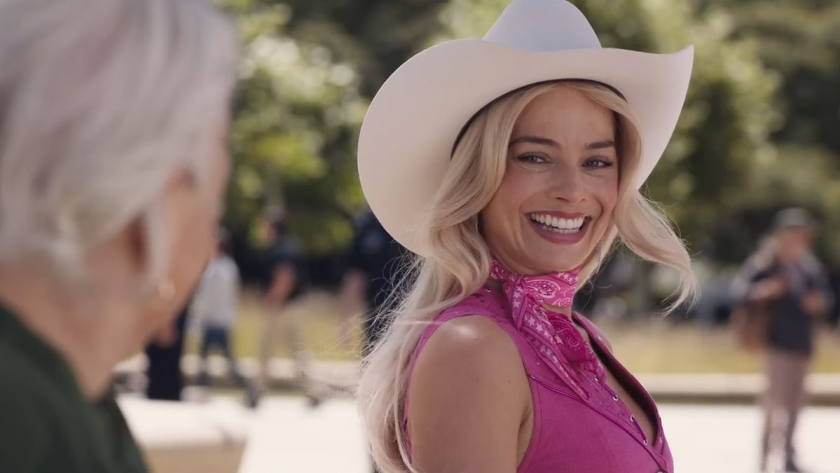Co-Editor-in-Chief, Sophiya Sian, reviews Greta Gerwig’s Barbie and the phenomenon that was Barbenheimer exactly one month after the films’ infamous release.
Exactly a month has passed and the glittered ashes of Barbenheimer have begun to settle. Having seen both films on the historical 21st July release, I failed to capitalise on the moment and instantly spill out a review – perhaps because ‘capitalise’ is exactly what this film masterfully, if disturbingly, achieves. After weeks of AI-generated trailers and pseudo-political 20 second takes, I was hesitant to write about a doll with whom I share very little beyond genitalia – and even this is not technically common ground for the majority of the film. Surrounded by strong, unwavering opinions on the film and its significance, the task of reviewing Barbie seemed to become synonymous with reviewing womanhood itself, and more specifically the right way to write about womanhood. However, I didn’t go to be empowered or nostalgia-dunked or to stick it to ‘the man’, I went to watch a well-crafted film, and that is what I saw.
A lot can be achieved with two hours in front of a screen, but a verdict on the creation of any weaponised tool and what it has come to represent is not one of them. This is something that will change depending on where we are in history and, to borrow Barbie-creator Ruth Handler’s motherly metaphor, these events ‘stand still so their children can see how far they’ve come’. Neither Nolan nor Gerwig signed up to offer a final judgement on the products of humanity, yet both agree (be it in black and white or blue and pink) that our only choice is to coexist with them – full well knowing the wonder and terror they have and will continue to bring.
Barbie is a protagonist who cannot be satisfied by the imagined or the real world, a disorienting thought. Nevertheless, having grown out of her DreamHouse she chooses (aware of the wonder and terror that await her) to become ‘a real girl’. This Pinocchio-like desire to experience life is pitched as inspiring – if a fictional, immortal doll chooses our reality over her own infinitely magical one, then who are we to mumble and grumble about weather, Wi-Fi, and the wait for death? I grinned at the film’s ending, half in admiration for its jarring wit and half in acceptance of the darker, more uncomfortable truth behind it.

For this we must return to the beginning. Not the pleasantly surprising Kubrick parody that opens Gerwig’s third directorial feature, but the beginning found at every bus stop, clothes shop, cosmetic brand or, if buses, clothes, and cosmetics aren’t your thing, perhaps burgers, games consoles and holiday homes were it. The film’s ‘beginning’ began many months before the big screen, and when we finally did sit in front of it, all dressed in pink, we conveniently left the cinema as walking billboards for the film. All of this, however, matters little – standard consumerism (ironic or not) that supplements but does not define a film. What does define a film though is its final purpose, which at some point turned from an existential satire into a doll selling our own re-packaged reality back to us.
We leave the cinema cheerily returning to the greys of the everyday, a little pinker perhaps slightly more ‘empowered’ but to do what exactly…to wait out change and return gratefully to reality? The same reality that rendered Barbie irrelevant is successfully sold back to us by none other than Barbie herself. Alas, capitalism, undeniably a beautiful beast.
But what about that speech! Surely that’s the ammunition we need to go battle this reality? Having watched Nolan’s Oppenheimer only hours earlier, I had become a little too aware that reality is much more complicated than a battle – for this reason, Gloria’s call to arms did not speak to me the way it may have spoken to those looking to be told what they already feel. If cinema is an art of “showing not telling,” the speech was not cinematic. Unlike Jo and her similarly emphatic speech in Gerwig’s Little Women (2019), the power of Gloria’s words depends more on audience investment in relatability than the character of Gloria herself. Go in looking to be empowered, and you will either be satisfied or underwhelmed. Go in looking for nothing in particular, and you will stumble upon Ruth Handler’s unexpectedly profound summary of the human experience:
“Being human is pretty uncomfortable, humans make things up like patriarchy and Barbie just to deal with how uncomfortable it is”.
Ruth Handler in Barbie (2023)
(They also make movies about dolls and bombs for the same reason.)

Gerwig’s blockbuster is a love letter to this uncomfortable humanity, if written with a poisoned pen. The same humanity that can create and appreciate both sides of the Barbenheimer phenomenon. A phenomenon which, under all its marketing and debate, did an impressive job at concealing the cinematic creativity of its participants. A playful combination of stand-up comedy and quirky magic, Barbie indulges in its own absurdities and asks us to do the same. The film is unquestionably a stunning achievement, but it is up to us, the consumer, to decide how much power we give it. I laughed at Ken’s squealed ‘sublime’, teared up at Ruth’s maternal truths and marvelled happily through the magnitude of the entire production, all whilst giving the film as much power over my view of reality as the doll itself – none.
Just as we will always find errors with Mattel’s attempts at body-inclusive plastic play, we will always find errors in its cinematic attempt at social-awareness. Opinion is after all the biggest commodity on sale here. Barbie, unlike Oppenheimer, chose to invest in this, impressively causing more divided opinion than the film actually dedicated to one of history’s greatest ethical dilemmas. Both films require an audience to experience their respective worlds and choose to live in neither one of them.

Balance is what Barbie the character and the film is ultimately craving. Unfortunately, neither go far enough to explore what this balance could look like. Instead, we are offered an inversion of the reality Barbie was made to escape. Margot Robbie’s Barbie completes her journey with the earnest wish to be part of the ‘people who make meaning and not the thing that is being made‘. Inevitably, we are both and must negotiate our freedom as both the makers and the products of meaning. For now, embracing the two sides of the Barbenheimer coin would not be a bad place to start.
Watch the official trailer for Barbie here:




